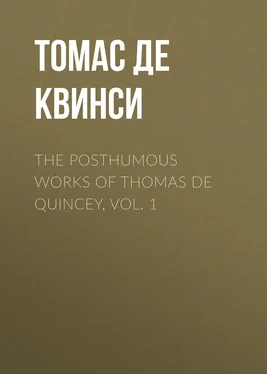Томас Де Квинси - The Posthumous Works of Thomas De Quincey, Vol. 1
Здесь есть возможность читать онлайн «Томас Де Квинси - The Posthumous Works of Thomas De Quincey, Vol. 1» — ознакомительный отрывок электронной книги совершенно бесплатно, а после прочтения отрывка купить полную версию. В некоторых случаях можно слушать аудио, скачать через торрент в формате fb2 и присутствует краткое содержание. Жанр: foreign_prose, literature_19, foreign_antique, на английском языке. Описание произведения, (предисловие) а так же отзывы посетителей доступны на портале библиотеки ЛибКат.
- Название:The Posthumous Works of Thomas De Quincey, Vol. 1
- Автор:
- Жанр:
- Год:неизвестен
- ISBN:нет данных
- Рейтинг книги:5 / 5. Голосов: 1
-
Избранное:Добавить в избранное
- Отзывы:
-
Ваша оценка:
- 100
- 1
- 2
- 3
- 4
- 5
The Posthumous Works of Thomas De Quincey, Vol. 1: краткое содержание, описание и аннотация
Предлагаем к чтению аннотацию, описание, краткое содержание или предисловие (зависит от того, что написал сам автор книги «The Posthumous Works of Thomas De Quincey, Vol. 1»). Если вы не нашли необходимую информацию о книге — напишите в комментариях, мы постараемся отыскать её.
The Posthumous Works of Thomas De Quincey, Vol. 1 — читать онлайн ознакомительный отрывок
Ниже представлен текст книги, разбитый по страницам. Система сохранения места последней прочитанной страницы, позволяет с удобством читать онлайн бесплатно книгу «The Posthumous Works of Thomas De Quincey, Vol. 1», без необходимости каждый раз заново искать на чём Вы остановились. Поставьте закладку, и сможете в любой момент перейти на страницу, на которой закончили чтение.
Интервал:
Закладка:
Two men are on record, perhaps many more might have been on that record, who wrote so many books, and perpetrated so many pamphlets, that at fifty they had forgotten much of their own literary villainies, and at sixty they commenced with murderous ferocity a series of answers to arguments which it was proved upon them afterwards that they themselves had emitted at thirty—thus coming round with volleys of small shot on their own heads, as the Whispering Gallery at St. Paul's begins to retaliate any secrets you have committed to its keeping in echoing thunders after a time, or as Sir John Mandeville under Arctic skies heard in May all those curses thawing, and exploding like minute-guns, which had been frozen up in November. Even like those self-replying authors, even like those self-reverberators in St. Paul's, even like those Arctic practitioners in cursing, who drew bills and post obits in malediction, which were to be honoured after the death of winter, many men are living at this moment in merry England who have figured in so many characters, illustrated so many villages, run away from so many towns, and performed the central part in so many careers, that were the character, the village, the town, the career, brought back with all its circumstances to their memories, positively they would fail to recognise their own presence or incarnation in their own acts and bodies.
We have all read the story told by Addison of a sultan, who was persuaded by a dervish to dip his head into a basin of enchanted water, and thereupon found himself upon some other globe, a son in a poor man's family, married after certain years the woman of his heart, had a family of seven children whom he painfully brought up, went afterwards through many persecutions, walked pensively by the seashore meditating some escape from his miseries, bathed in the sea as a relief from the noon-day heat, and on lifting up his head from the waves found himself lifting up his head from the basin into which that cursed dervish had persuaded him to dip. And when he would have cudgelled the holy man for that long life of misery which had, through his
Конец ознакомительного фрагмента.
Текст предоставлен ООО «ЛитРес».
Прочитайте эту книгу целиком, купив полную легальную версию на ЛитРес.
Безопасно оплатить книгу можно банковской картой Visa, MasterCard, Maestro, со счета мобильного телефона, с платежного терминала, в салоне МТС или Связной, через PayPal, WebMoney, Яндекс.Деньги, QIWI Кошелек, бонусными картами или другим удобным Вам способом.
1
See the story of the young soldier who told his officer, on having been struck by him, that 'he would make him repent it.' (Close of autobiographic sketch, 'Infant Literature.')
2
Three thousand children are annually burnt to death in the nations of England and Scotland, chiefly through the carelessness of parents. I shudder to add another and darker cause, which is a deep disgrace to the present age.
3
Count Massigli (an Austrian officer in the imperial service) about sixty years ago fathomed and attempted to fathom many parts of the Mediterranean and the Atlantic. If I remember rightly, he found the bottom within less than an English mile.
4
The story and the verses are, or used to be, well known. A schoolboy, forbidden to return home at the holidays, is suspected to have written the lyrical Latin verses upon the rapture of returning home, and to have breathed out his life in the anguish of thus reviving the images which for him were never to be realized.... The reader must not fancy any flaw in the Latin title. It is elliptic; revisere being understood, or some similar word.
5
I allude to the signatures of nature.
6
How purified? And if it should be answered, through and under Christianity, the fool in his heart would scoff and say: 'What woman thinks of religion in her youthful courtship?' No; but it is not what she thinks of, but what thinks of her; not what she contemplates in consciousness, but what contemplates her, and reaches her by a necessity of social (? ideal) action. Romance is the product of Christianity, but so is sentiment.
7
Even in Rome, where the purple (whatever colour that might have been) is usually imagined to be the symbol of regal state—and afterwards their improved arts of dyeing, and improved materials, became so splendid that it was made so—white had always been the colour of a monarchy. ['A white linen band was the simple badge of Oriental royalty' (Merivale's 'History of Rome,' ii., p. 468).—Ed.]
8
This was the case even with the Homeric Greeks. Mr. Gladstone makes a point of this (see 'Juventus Mundi,' p. 429): 'The privates of the army are called by the names of laos , the people; demos , the community; and plethūs , the multitude. But no notice is taken throughout the poem of the exploits of any soldier below the rank of an officer. Still, all attend the Assemblies. On the whole, the Greek host is not so much an army, as a community in arms.' Even the common people, not only in cities but in camps, assembled to hear the deliberations of the chiefs.—Ed.
9
Notwithstanding what he had written in the essay on the 'Essenes,' no doubt De Quincey, if he had completed this paper, could not have escaped characteristic, and perhaps grimly humorous, references of his own to the Sicarii, of whom Josephus has a good deal to tell in his 'Jewish War'; for it seems to us his thoughts were bearing directly that way. Josephus says of the Sicarii: 'In these days there arose another sort of robbers in Jerusalem, who were named Sicarii, who slew men in the day-time and in the middle of the city, more especially at the festivals. There they mixed with the multitude, and having concealed little daggers under their garments, with these they stabbed those that were their enemies; and when any fell down dead, the murderers joined the bystanders in expressing their indignation; so that from their plausibilities they could by no means be discovered. The first man that was slain by them was Jonathan the high-priest, after which many were slain every day.'—Ed.
10
'Postern-gate.' See the legend of Sir Eustace the Crusader, and the good Sir Hubert, who 'sounded the horn which he alone could sound,' as told by Wordsworth.
Интервал:
Закладка:
Похожие книги на «The Posthumous Works of Thomas De Quincey, Vol. 1»
Представляем Вашему вниманию похожие книги на «The Posthumous Works of Thomas De Quincey, Vol. 1» списком для выбора. Мы отобрали схожую по названию и смыслу литературу в надежде предоставить читателям больше вариантов отыскать новые, интересные, ещё непрочитанные произведения.
Обсуждение, отзывы о книге «The Posthumous Works of Thomas De Quincey, Vol. 1» и просто собственные мнения читателей. Оставьте ваши комментарии, напишите, что Вы думаете о произведении, его смысле или главных героях. Укажите что конкретно понравилось, а что нет, и почему Вы так считаете.











